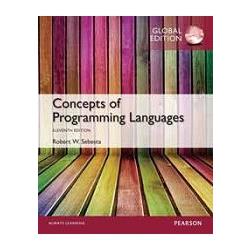CONCEPTS OF PROGRAMMING LANGUAGES 11/E (GE)
活動訊息
內容簡介
For courses in computer programming.
Evaluating the Fundamentals of Computer Programming Languages
Concepts of Computer Programming Languages introduces students to the fundamental concepts of computer programming languages and provides them with the tools necessary to evaluate contemporary and future languages. An in-depth discussion of programming language structures, such as syntax and lexical and syntactic analysis, also prepares students to study compiler design.
The Eleventh Edition maintains an up-to-date discussion on the topic with the removal of outdated languages such as Ada and Fortran. The addition of relevant new topics and examples such as reflection and exception handling in Python and Ruby add to the currency of the text. Through a critical analysis of design issues of various program languages, Concepts of Computer Programming Languages teaches students the essential differences between computing with specific languages.
本書特色
Concepts of Computer Programming Languages uses the following features to facilitate learning:
UPDATED! The most current information on contemporary computer programming languages
●REVISED! Much of the discussion on outdated languages Ada and Fortran have been removed, including:
。Chapter 6 description of Ada’s records, union types, and pointers.
。Chapter 8 discussion of Ada’s for statement.
。Chapter 10 example Main_2 has been rewritten from Ada to Javascript.
。Chapter 11 section on Ada’s abstract data types.
●Chapter 4 discusses the important topics of lexical and syntactical analysis and can stand alone from the rest of the book as its own source material.
●REVISED! Chapter 12 has been substantially revised with new sections and paragraphs, including an added a section on reflection with two complete program examples and a table of design choices of common languages that support object-oriented programming.
●Chapters 5-14 discuss in detail the design issues of contemporary programming languages, using specific examples to demonstrate each.
。Chapter 5 covers the many characteristics of variables.
。Chapter 6 explains different data types.
。Chapter 7 discusses expressions and assignment statements.
。Chapter 8 explains control statements.
。Chapters 9 and 10 cover subprograms and their implementations.
。Chapter 11 examines data abstraction facilities.
。Chapter 12 details language features that support object-oriented programming.
。Chapter 13 discusses concurrent program units.
。NEW! Chapter 14 has added a discussion of exception handling in Python and Ruby.
●Chapters 15 and 16 introduce and explain functional programming and logic programming, two of the most important alternative programming paradigms, with an introduction to and discussion of Scheme, ML, Haskell, and F#, as well as the logic programming language Prolog.
The fundamental concepts of programming languages are taught through detailed examination of specific languages
●Chapter 3 introduces formal methods for describing the syntax and semantics of programming languages.
●Chapters 4 and 10 discuss implementation techniques for various language constructs using lexical and syntax analysis and the implementation of subprogram linkage.
●Coverage of advanced object-oriented topics and languages is integrated throughout.
A historical viewpoint provides context for learning different programming languages
●NEW! Chapter 2 outlines the evolution of various languages to help students get a sense of their histories.
●Historical boxes and interviews with James Gosling, Larry Wall
目錄
Ch1: Preliminaries
Ch2: Evolution of the Major Programming Languages
Ch3: Describing Syntax and Semantics
Ch4: Lexical and Syntax Analysis 161
Ch5: Names, Bindings, and Scopes 197
Ch6: Data Types
Ch7: Expressions and Assignment Statements 301
Ch8: Statement-Level Control Structures
Ch9: Subprograms
Ch10: Implementing Subprograms
Ch11: Abstract Data Types and Encapsulation Constructs
Ch12: Support for Object-Oriented Programming
Ch13: Concurrency
Ch14: Exception Handling and Event Handling
Ch15: Functional Programming Languages
Ch16: Logic Programming Languages
配送方式
-
台灣
- 國內宅配:本島、離島
-
到店取貨:
不限金額免運費



-
海外
- 國際快遞:全球
-
港澳店取:


訂購/退換貨須知
退換貨須知:
**提醒您,鑑賞期不等於試用期,退回商品須為全新狀態**
-
依據「消費者保護法」第19條及行政院消費者保護處公告之「通訊交易解除權合理例外情事適用準則」,以下商品購買後,除商品本身有瑕疵外,將不提供7天的猶豫期:
- 易於腐敗、保存期限較短或解約時即將逾期。(如:生鮮食品)
- 依消費者要求所為之客製化給付。(客製化商品)
- 報紙、期刊或雜誌。(含MOOK、外文雜誌)
- 經消費者拆封之影音商品或電腦軟體。
- 非以有形媒介提供之數位內容或一經提供即為完成之線上服務,經消費者事先同意始提供。(如:電子書、電子雜誌、下載版軟體、虛擬商品…等)
- 已拆封之個人衛生用品。(如:內衣褲、刮鬍刀、除毛刀…等)
- 若非上列種類商品,均享有到貨7天的猶豫期(含例假日)。
- 辦理退換貨時,商品(組合商品恕無法接受單獨退貨)必須是您收到商品時的原始狀態(包含商品本體、配件、贈品、保證書、所有附隨資料文件及原廠內外包裝…等),請勿直接使用原廠包裝寄送,或於原廠包裝上黏貼紙張或書寫文字。
- 退回商品若無法回復原狀,將請您負擔回復原狀所需費用,嚴重時將影響您的退貨權益。












商品評價